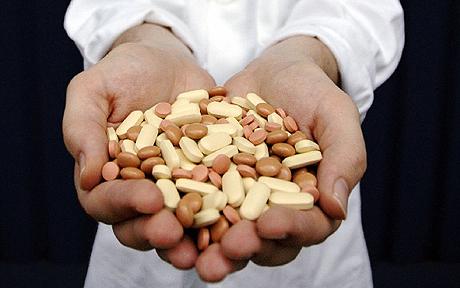Natural News
By Ethan Huff
April 10, 2013
 (NaturalNews) As if mental health patients are not already taking enough pharmaceuticals, a group of scientists from the U.K. recently published a study chastising the mental health profession for allegedly “under-medicating” those with mental illnesses. According to the outrageous study, which was published in the British Journal of Psychiatry, the physical health needs of mental patients are apparently being overlooked, which is causing many of these patients to suffer cardiovascular disease and various other conditions at a measurably higher rate than the rest of the population.
(NaturalNews) As if mental health patients are not already taking enough pharmaceuticals, a group of scientists from the U.K. recently published a study chastising the mental health profession for allegedly “under-medicating” those with mental illnesses. According to the outrageous study, which was published in the British Journal of Psychiatry, the physical health needs of mental patients are apparently being overlooked, which is causing many of these patients to suffer cardiovascular disease and various other conditions at a measurably higher rate than the rest of the population.
Dr. Alex Mitchell and his colleagues from the University of Leicester evaluated 61 existing studies on the physical health of mental patients for their research, which led them to the conclusion that mental patients are not getting the physical care they need to have a chance at a healthy future. It appears as though the primary focus among mental health professionals is obviously to treat the mental health needs of their patients, while physical health often gets inadvertently thrown by the wayside.
“Mental health professionals may not feel confident in prescribing medication to treat physical problems, and hospital specialists may be worried about interactions of mental health medication,” explained Dr. Mitchell about his team’s findings. According to the data, mental patients are under-treated by about 10 percent compared to the rest of the population. “However, we cannot rule out the possibility that medical conditions are being under-treated where they co-exist with mental health problems.”
Psychiatric drugs responsible for causing serious physical harm in many patients
The irony in all this is that many of the psychiatric drugs administered to mental patients carry with them deadly side effects, including things like stroke, heart attack, and sudden death. These drugs can also trigger hallucinations, psychosis, and suicidal tendencies in mental patients, which in turn takes a significant toll on their physical health. The end result of the conventional psychiatric treatment process, in other words, is a life of drug addiction, which most certainly leads to severe health problems that require even further treatment. (https://www.cchrint.org/psychiatric-drugs/)
But are more drugs really the answer to this problem? Dr. Mitchell might like to think so, but the truth of the matter is that most mental patients more than likely need fewer drugs and improved nutrition. After all, an increasing number of the so-called mental illnesses listed in the Diagnostic and Statistical Manual of Mental Disorders are not actually diseases at all, but rather made-up conditions hatched by the pharmaceutical industry to sell more drugs. (http://www.naturalnews.com)
For those with legitimate mental health issues, simple dietary and lifestyle changes, some of which are listed here at the Earth Clinic (http://www.earthclinic.com/CURES/mental_illness.html), have helped many people not only overcome their conditions, but also strengthen their physical health. At the very least, mental patients undergoing conventional treatments could use a simultaneous regimen of intense, nutrient-dense nutrition to ease the toxic burden their bodies are having to sustain as a result of all their medications.
http://www.naturalnews.com/039856_mental_health_psychiatric_drugs_patients.html


SHARE YOUR STORY/COMMENT